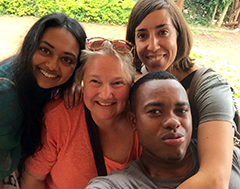It’s our travel day and I’m cruising along the Tanzanian highway with sunrise happening over the mountains on my left and the Great Rift Valley on my right. It’s not hard to believe that our ancestors came from here. It’s breathtakingly beautiful. Shruti, one of our students, just woke up in the back seat, looked out the window, and said she had chills. Yes – it’s THAT beautiful.
If we’re on the road, you’ve probably already guessed that we are leaving Moshi. We have a caravan of three jeeps and a little white minivan. It’s been a fantastic journey so far, made more so by the amazing group of students with us. The students that I have with me will be leaders in global health as they understand the magnitude and complexity of problems in other parts of the world. I’m impressed with them. It’s the largest group of students I’ve traveled with, but they all work well together, so the trip has gone smoothly. Oh yes, we’ve had plenty of TIA (This is Africa) moments as you’ll hear, but they’re rolling with the punches.
We spent three action-packed days in Mowo. When last I wrote, I told you about the students giving the public health lectures at the school. We’re constantly reminded on this trip why public health is so important in these parts. When you’re in a country where there is one physician for 250,000 people, mass health techniques become critical for keeping a community healthy. Simple things like hand-washing, coughing and sneezing into your elbow, nutrition, and exercise can prevent many diseases. Public health is one of those things that effects everything. If public health isn’t working, likely medicine isn’t going to fix it.
One of our students made an astute observation. She said, “It seems kind of hypocritical that we are teaching hand-washing when it’s something that most Americans skip regularly.” True. Yet, let’s look at the environment. This is a place that doesn’t have flush toilets, but instead uses squat toilets in an outhouse; and there’s typically not toilet paper in the village. Some people bush-choo (this means that they poop in the woods) – and the waste runs downhill into the farms and yards of other people. Add to that, people here often eat with their hands. The importance of hand-washing takes on new meaning, right?
In addition to hokey-pokey-ing with the school children on Friday, the students hiked the village paths with the village herbalist as he pointed out dozens of herbs and talked about what they’re good for. Wearing his best shiny pink pants, the herbalist showed up with a huge smile on his face. He loved the students last year and was excited to share his knowledge again. It had rained in the village, and the trails were slick and muddy. Fortunately only a couple of students wiped out. This crew is full of mountaineering types with good balance. Paul, our faculty member who is our group herbalist, said he only recognized about 10 percent of the plants in the village. Thinking about how much plant medicine is held in that ethnobotanical diversity can blow your mind!
The faculty left the students in the village to do a home stay with host families. Often this is the part of the trip that gives the students the best insight into the challenges of healthcare in Tanzania. If you think you can administer a ‘western’ style intervention, you need only spend one night in the village to begin to understand life on Kilimanjaro and the huge number of factors that affect health. Clean water, clothing/warmth, and food are the priority, of course. Sanitation comes close behind. If you have easy access to things all the time like we do in the US, it doesn’t occur to you that others live differently. It may take a villager all day to simply prepare a meal. After living with a family for even one night, the students are better able to appreciate Maslow’s hierarchy of needs.
Harmonies soared out over the foothills of Kilimanjaro on Sunday, as we attended church in the village. Whether you’re religious or not, a village service can’t help but move you. Singing, clapping, and dancing, is mixed among the Bible verses which are spoken in Swahili or Chaga (the native language). We all felt a ‘Kilimanjaro high’ after the service. In case you’re wondering, Kilimanjaro high is a variant of Rocky Mountain High, with no marijuana required (#RIP John Denver.)
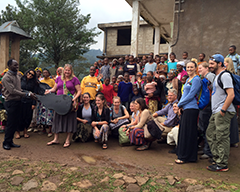 The community honored us at the church service service. We had brought books for the school, medical supplies for the clinic, and music in the form of guitars and speakers and amps for the church. They brought us to the front of the nave and sang to us, letting out loud woops of joy. The gratitude they felt was palpable, and my students cried tears of happiness. These villagers shared their lives with us, and we were so grateful.
The community honored us at the church service service. We had brought books for the school, medical supplies for the clinic, and music in the form of guitars and speakers and amps for the church. They brought us to the front of the nave and sang to us, letting out loud woops of joy. The gratitude they felt was palpable, and my students cried tears of happiness. These villagers shared their lives with us, and we were so grateful.
 After we left the village, we headed back to Mowo to do some more formal class. The perfect time to discuss worms is after spending a few days in the village. But it was after dark, and there wasn’t enough light to do the lesson. So the students pulled out their cell phone flashlights, balanced them on water bottles to create make-shift lamps, and worked on worm case studies. TIA. There are so many sources of worms and intestinal parasites in these parts. They also had a discussion on clean water and WHO priorities for water access with Elizabeth.
After we left the village, we headed back to Mowo to do some more formal class. The perfect time to discuss worms is after spending a few days in the village. But it was after dark, and there wasn’t enough light to do the lesson. So the students pulled out their cell phone flashlights, balanced them on water bottles to create make-shift lamps, and worked on worm case studies. TIA. There are so many sources of worms and intestinal parasites in these parts. They also had a discussion on clean water and WHO priorities for water access with Elizabeth.
On our last day in Moshi, we went to the Pamoja Boys & Girls Club. This is a group that cares for some of Moshi’s most vulnerable kids, homeless youth. Finding them housing and teaching them skill sets that are marketable is the primary goal of the club. The kids of Pamoja make jewelry and bags out of the colorful Tanzanian kitanga material to raise money for their group. They’re also learning how to make promotional videos using their cell phones so they can make videos for the local hotels. The NUNM students did a health scavenger hunt with the kids, identifying things in their environment that made them healthy. And then the real fun began. A volleyball game broke out in the front yard, and a break-dance party erupted in the living room. It was hard to tear the NUNM students away from the kids when it was time to go.
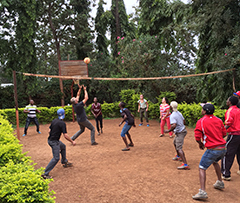 I wasn’t sure if a day with the Boys & Girls Club was a good idea. A friend had challenged me: What’s the good of some NUNM students spending a couple of hours with homeless youth in Tanzania? But after witnessing the morning, the value was more than obvious. The youth were inspired to work on their English, learned some new health techniques, and found playmates. The NUNM students learned to connect beyond language. They found things in common with people whose lives bear little resemblance to their own. And they practiced compassion – one of the most important skills for a physician. After the morning, several of the NUNM students told me that this was the best part of the trip so far.
I wasn’t sure if a day with the Boys & Girls Club was a good idea. A friend had challenged me: What’s the good of some NUNM students spending a couple of hours with homeless youth in Tanzania? But after witnessing the morning, the value was more than obvious. The youth were inspired to work on their English, learned some new health techniques, and found playmates. The NUNM students learned to connect beyond language. They found things in common with people whose lives bear little resemblance to their own. And they practiced compassion – one of the most important skills for a physician. After the morning, several of the NUNM students told me that this was the best part of the trip so far.
Truthfully, we have had lots of ‘best parts’… and we’re only half done.
And now for the road-trip. Road-tripping in Tanzania is always an adventure. The vehicles are in various states of dis-repair, and the roads are worse. So you can never be sure what is going to happen. However, when the airlines raised the prices of tickets to Zanzibar from $75 to $350, it forced us to use a different mode of transportation to get from Moshi to Zanzibar. Road-tripping from Moshi to Dar and then taking the ferry from Dar to Zanzibar was our plan.
For me, road-trip day began at 11 p.m. when I started to itch. I woke up again at 3 a.m. covered in welts. There wasn’t a mosquito in sight. As I laid there itching, it occurred to me that Elizabeth had bites all over feet and ankles – and had been complaining that there was something in her bed. I had spent late Monday afternoon lying at the foot of Elizabeth’s bed as we discussed more trip logistics. And now I was covered in bites. Bed bugs? That was our first guess. Paul thinks its more likely fleas. Whichever, I have more than 200 bites on my hips, waist, stomach, back, chest, and along my hairline. I even have three bites on my eyelids. I’m a mess and I’m avoiding selfies, so no, you can’t see it.
I spent the night researching how to treat bed bug bites. Many of the treatments weren’t readily available at 3 a.m. in Moshi. Witch Hazel? No. Baking Soda? No. But when I reached the students at 5 a.m. to load the car, they came up with tea tree oil, a lemon, and some Benadryl. And that’s what is keeping me sane right now. Otherwise, I might scratch my eyes out.
BREAK.
It’s now the next day, and I’m on the ferry to Zanzibar. Wanted to finish telling you about our road-trip mishaps.
First were the police. I was in the mini-van with Julius and two of the students. When the police stopped us at 8:30 a.m., we’d already been on the road for three hours. They opened the back of the van, looked at my bag, took it out, shook it, and put it back. We could go. The crew in Sky’s jeep got a closer inspection. The police crawled into the jeep with them. Mike, one of our students, had a bag of sage tea in his backpack, and they found it. It was definitely suspect, and he got some raised eyebrows, but after smelling it, they let him keep it. Likely, they were just looking for some money for breakfast.
We stopped ourselves for breakfast in a roadside restaurant that could be fodder for a Tom Robbins novel. Restaurants in Tanzania can be somewhat baffled when a large group of mzungus arrives in their midst. Some places handle it with grace. Others… not so much. At this restaurant, the waiter took the orders of five of our students. Then he went into the kitchen to wait for the cook to prepare it. When he brought the food out for the first five, he decided he could take the order of the next five. Now, considering that we were in a group of 22 with drivers and translators, it was clear that breakfast was going to take hours. We had a schedule to keep. We needed to get to Dar before 4 p.m. so that we could buy ferry tickets. Julius and the crew in my car skipped breakfast and took off early to buy ferry tickets for the rest of the group. I collected everyone’s passports and we started speeding toward Dar. Every couple of hours as we drove, the students with me would rub more lemon juice on my back while I applied it to my front to help with the itching. I smelled like a giant glass of lemonade. TIA.
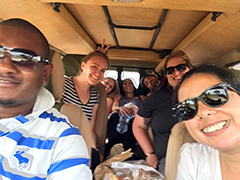 Meanwhile, back with the rest of the group, the driver of Julius’ second vehicle, Bazil, noticed that the jeep was losing power. The turbo motor had died. The students from that jeep had to squeeze into the other two vehicles while Bazil puttered along behind with just the luggage. Crowded jeeps, no air-conditioning, and a 12-hour drive to Dar. You’d think that would push the students over the edge, wouldn’t you? But not this group. They were cool. In fact, they had great discussions with each other and actually enjoyed the ride! They arrived in Dar safely… although three blocks before they reached the hotel, Sky’s jeep got a flat. And the jack broke. TIA.
Meanwhile, back with the rest of the group, the driver of Julius’ second vehicle, Bazil, noticed that the jeep was losing power. The turbo motor had died. The students from that jeep had to squeeze into the other two vehicles while Bazil puttered along behind with just the luggage. Crowded jeeps, no air-conditioning, and a 12-hour drive to Dar. You’d think that would push the students over the edge, wouldn’t you? But not this group. They were cool. In fact, they had great discussions with each other and actually enjoyed the ride! They arrived in Dar safely… although three blocks before they reached the hotel, Sky’s jeep got a flat. And the jack broke. TIA.
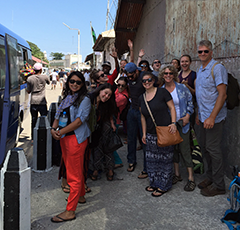 Just to keep the students on their toes, I told them that we had missed getting ferry tickets, and we’d be taking wooden row boats to Zanzibar. They believed me. One student even called her parents to say good-bye in case we didn’t make it! I knew I was a good actress, but I didn’t realize I was that good. This morning when we boarded our luxury high-speed ferry, and entered the VIP coach, they were much happier, having expected less. This is an important strategy for the future. I’m pretty sure my mother used it on me.
Just to keep the students on their toes, I told them that we had missed getting ferry tickets, and we’d be taking wooden row boats to Zanzibar. They believed me. One student even called her parents to say good-bye in case we didn’t make it! I knew I was a good actress, but I didn’t realize I was that good. This morning when we boarded our luxury high-speed ferry, and entered the VIP coach, they were much happier, having expected less. This is an important strategy for the future. I’m pretty sure my mother used it on me.
We’re now in Zanzibar and the students are enjoying the extra-high tide that came along with the full moon. We’ll be heading to the Sponge farm tomorrow. The students are learning about the importance of permaculture in global health environments.
I hope you are well and that you have less mast cell degranulation than me!
Sending love from Zanzibar!
Heather
